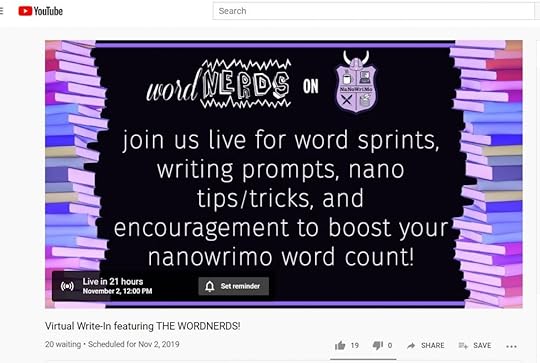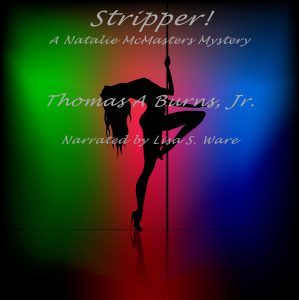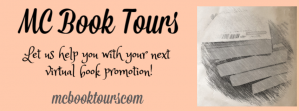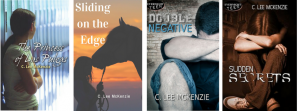Riley Adams's Blog, page 56
November 14, 2019
Writing Resources
by Elizabeth S. Craig, @elizabethscraig
Today I thought I’d share some of the different tools and resources I used this year to make my writing and writing life go a little smoother. Maybe some of them will make it on your Christmas lists this year. :)
I spent a little more time on story development this year than I usually do, with the start of a new series (my first new series since circa 2010). That’s why you’ll see craft-related books on the list.
Sparkling Story Drafts by H.R. D’Costa, who’s guest-blogged here, is a great book for helping writers plan their books. Glancing through the guide, I’ve written the most marginalia in these chapters: Enhancing Cohesion With Overarching Principles, Increase the Emotional Resonance of Your Ending (Without Breaking a Sweat), and The Ideal Cast Size (and How to Achieve It). This book was so useful to me that I wrote an endorsement for it. :)
Also by H.R. D’Costa is her Sizzling Story Outlines. Although I have a template that I use for outlines, I needed more for the new series. I had so many things to consider, to create. With my other series, everything always just falls into place…not so much for a new project. My marginalia is heaviest in these chapters: Getting Started via the Story Kernel, Shaping Audience Experience Via Smart Goals and the Protagonist, Conjuring Conflict to Entertain Audiences Via the Antagonist, and An Overview of the Outlining Method.
For my older series, I wanted something to help me move my mind in different directions in terms of brainstorming. When I heard about Plotto by William Cook (originally published in 1928), I was intrigued. When you first look at the book, it seems to be written in code. I’m not using the book as systematically as it’s intended, just to keep my stories fresh. Despite the fact the book was written nearly 100 years ago, it definitely helps generate new ideas. Read this article on NPR for more about the book.
I also leaned heavily on Angela Ackerman and Becca Puglisi’s Positive Trait Thesaurus, Negative Trait Thesaurus, and Emotion Thesaurus. I’d recommend these books to anyone taking character development and expression seriously. Character development seemed easy enough to me…until I started a new series, ha. I’d forgotten how tough it can be.
Now for a few tools I use daily. Google Keep helps keep me straight with both reminders and story notes on the go (free). Google Drive gives me a free place to backup my work (which I do daily). The Canned Responses extension for gmail helps me save time by creating email templates for common responses. Evernote is where I store my favorite writing-related articles (as well as recipes, etc.) And I recommend that every writer keeps a story bible of all the minutiae in their stories (I couldn’t make it without mine).
That’s what’s given me the biggest help in 2019. What are some of your favorite resources?
Helpful Writing-Related Books and Tools:
Click To Tweet
Photo on Visual Hunt
The post Writing Resources appeared first on Elizabeth Spann Craig.
November 10, 2019
You Got Your Endorsements, Now What?
by David Wogahn, @Wogahn
Let’s say you’ve followed Elizabeth’s advice about asking for endorsements—and your endorser(s) came through. Congratulations! Now what?
Endorsements, or what’s been traditionally called a ‘blurb,’ are essentially marketing tools. Here are ten ways they can be used, not all of which are appropriate for all types of endorsements.
On the front and/or back cover of your book
At the very beginning of your book
In media kits and on collateral such as bookmarks
On your book’s sales page on online stores (on Amazon this area is called Editorial Reviews)
In your website and social media postings
In your bios, including those used for social media accounts
In your email signature
In email newsletters to your mailing list
In letters or emails to potential partners, retailers, wholesalers
In emails to other endorsers when you ask them to blurb your book! (In fishing, this is called chumming the water.)
Obviously if you have one, or very few, the decisions are easier. Also, you don’t have to include endorsements in all ten of the applications in the above list and you can always add them as they become available.
How to use endorsements (editorial reviews) on Amazon and IngramSpark
In the list of ten possible places to use endorsements, you’ll notice that it is in order of permanence. That is, adding endorsements to books is usually done before they are published and then rarely updated due to the work involved.
For purposes of this article, I want to focus on number four, putting these endorsements to work on your book’s online sales page.
Amazon and IngramSpark are notable because they allow self-publishers to add editorial reviews directly to a book’s sales page in selected online stores. Traditionally published authors can also do this on Amazon (via Author Central), but you need to ask your publisher for help with other online stores.
Adding editorial reviews on Amazon
The reviews listed under the Editorial Reviews section for a book’s listing on Amazon appear there by manually entering them using Author Central or are placed there automatically by select review businesses (for example, Publishers Weekly, Booklist, and School Library Journal).
You can add or edit Editorial Reviews for each format that is listed for sale or on pre-order. For example, my client Jill Thomas’ book Tales from the Trance was traditionally published. Her hardcover was available for pre-order, but not the Kindle edition. I was able to add editorial reviews for the hardcover before the release date but had to wait for the Kindle to be available before adding editorial reviews to that edition. It works the same way for self-published books.
Pre-release view, hardcover only book format
Hardcover only: Pre-release view of a book’s Author Central page
Live-release view, Kindle and hardcover formats
Here is the view of Jill’s Author Central page five days later. You manage Editorial Reviews for each format separately.

Additional notes about editing Editorial Reviews using Author Central
In a few instances I’ve found it necessary to ask Amazon for help in formatting Editorial Reviews. When that happens, they turn off your ability to make further changes. I think this is because their HTML editor is a little wonky—at least that’s my experience. Be prepared to experiment, or just give up and ask for help.
As previously noted, some reviews are placed here automatically. In fact, those are added under their own heading under the top-level heading of Editorial Reviews. If that is the case with your book, you won’t be able to edit or remove those. Amazon states: “In order to keep Editorial Reviews objective and informative, we rely on many sources to provide content for this section. We work to create a diversity of opinion on our site, and this may include negative reviews, when they arise.”
Managing your Author Central profile for other country-specific Amazon stores isn’t as easy as it is for the U.S. store. In my experience you need to use their contact forms to have the changes made by Amazon staff.
Adding editorial reviews on IngramSpark
If you are using IngramSpark to distribute your book to stores such as Barnes & Noble, they too have a field where you can enter editorial reviews. In their system these are called Review Quotes.
Login to your account and select your book. You will find the field to enter Review Quotes in the section titled Categorize Your Book.
It usually takes a couple weeks for these to appear on BN.com (Barnes & Noble) and Indigo.ca, the large Canadian book retailer. Whether the reviews appear on other retailer websites that IngramSpark distributes to is up to those retailers and is not something IngramSpark guarantees. For example, my books on Books-a-Million and Powell’s do not show Review Quotes even though they are entered in IngramSpark.
I’ll close with this excellent and concise advice from IngramSpark:
Include two to eight positive review quotes. These should be from a variety of sources and should highlight different aspects of the book. Ideally, reviews will come from people and publications known by and influential with potential buyers.
Each quote should be brief (no more than fifty words each). Provide excerpts from longer reviews.
List the most powerful or effective review quote first.
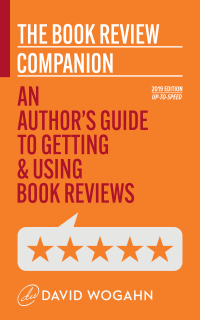
David Wogahn is the author of five books including The Book Review Companion, My Publishing Imprint and Register Your Book, and he is a LinkedIn Learning author. He has worked for the Los Angeles Times, the Los Angeles Olympic Organizing Committee, and was co-founder and COO of the first online publisher of sports team branded websites known today as the CBS College Sports Network.
He is a frequent speaker and trainer, including presentations for Publishing University (IBPA), the Alliance of Independent Authors (ALLi), the Independent Writers of Southern California, and the Santa Barbara Writers Conference.
David is also the president of AuthorImprints, an award-winning professional publishing services company that publishes books for authors and businesses using their own publishing imprint. Learn more at AuthorImprints.com and DavidWogahn.com.
How to Use Endorsements on Amazon and IngramSpark by @Wogahn
Click To Tweet
Photo on Visualhunt.com
The post You Got Your Endorsements, Now What? appeared first on Elizabeth Spann Craig.
November 9, 2019
Twitterific Writing Links
by Elizabeth S. Craig, @elizabethscraig
Twitterific writing links are fed into the Writer’s Knowledge Base search engine (developed by writer and software engineer Mike Fleming) which has over 50,000 free articles on writing related topics. It’s the search engine for writers.
Have you visited the WKB lately? Check out the new redesign where you can browse by category, and sign up for free writing articles, on topics you choose, delivered to your email inbox! Sign up for the Hiveword newsletter here.
Business / Miscellaneous
Business Musings: Money: 3 Deal Memos (Contract/Negotiation…and…Rethinking The Writing Business): @KristineRusch
3 Ways to Get Your Dream Endorsement: @sandrabeckwith @JFbookman
Conferences and Events / Miscellaneous
Finding Inspiration at a Writing Conference (Or Any Conference): @jcwalton24 @DIYMFA
Four Debuts Shortlisted for UK’s Times/Warwick Young Writer Award: @Porter_Anderson @pubperspectives
Jean-Paul Dubois Wins France’s 2019 Prix Goncourt: @Porter_Anderson @pubperspectives
The UK’s Women’s Prize and Germany’s NonFiction Prize Name Jurors: @Porter_Anderson @pubperspectives
DSC Prize for South Asian Literature Announces 2019 Shortlist: @Porter_Anderson @pubperspectives
France’s Arab Literature Prize to Egyptian Author Muhammad Abdelnabi: @oliviasnaije @pubperspectives
Conferences and Events / NaNoWriMo
Tips for *Unofficially* Participating in NaNoWriMo:
Creativity and Inspiration / First Novels
12 Essential Reminders for Anyone Getting Ready to Start Writing a Book: @MegDowell
Creativity and Inspiration / Goal setting
Different Options for Writing Goals: by Leslie Watts @StoryGrid
Creativity and Inspiration / Inspiration / Reading as Writers
8 Novels Featuring Atypical Amateur Sleuths: by Sarah Lotz @CrimeReads
Five Fantasy Books Steeped in History: @cephiedvariable @tordotcom
Creativity and Inspiration / Productivity / Fitting in Writing
7 Steps to Developing a Daily Writing Practice: @NinaAmir
Creativity and Inspiration / Writing Life
How To Find Health Insurance For Authors: @LisaLatteBooks
What Does it Take to Be a Real Writer? @sara_crawford @LiveWriteThrive
The US Tour That Made Gertrude Stein a Household Name: by Roy Morris Jr. @lithub
Burnout – What It Is and How to Prevent It: @Peter_Rey_
Focus on Writing the Best Book You Can: @RachelleGardner
How to Write Regularly Without Getting Sick of It: A Quick Guide: @MegDowell
Make Writing Easy On Yourself: @aprildavila
The Hack’s Guide to Breaking Up With Your Book: @BillFerris @WriterUnboxed
An Ode To Walking: @AuthorTracyRees @WomenWriters
Don’t be Afraid to Go There in Your Writing: @jamesscottbell
Writing Retreats: Why They’re Productive: by Heather Dyer
Trust Your Creativity And Choose Yourself: @jenlouden @thecreativepenn
10 Ways Perfectionism Kills the Writer (And 10 Ways it Doesn’t): @KelsieEngen @TheRyanLanz
Genres / Fantasy
A Quiet Hero’s Journey: Processing Trauma in Fantasy: @cloudy_vision @tordotcom
Genres / Horror
Finding Original Locations to Set Your Horror Stories: @richardgthomas3 @LitReactor
Genres / Miscellaneous
Can Climate Fiction Be… Hopeful? @DiFantastico @millcitywriter @lithub
Mystery Novelist @mike54martin on Writing a Christmas-Themed Book:
Genres / Romance
Anatomy of a Romantic Comedy: Seven Essential Story Beats: @lynsaymccaulley @kristen_kieffer
Genres / Science Fiction
Why the YA Sci-fi Market Sucks: @alexadonne
Genres / Screenwriting
Tips for Adapting Your Novel Into a Screenplay: @NaomiBeaty @savethecat
The Ultimate Story Checklist: Get Out: @CockeyedCaravan
Genres / Young Adult
Five Ways to Handle Parents Without Killing Them: by Oren Ashkenazi @mythcreants
Promo / Ads
6 Book Ad Design Tools Authors Can Use: by Mena Hassan @BookBub
Promo / Blogging
Tips for Better Blog Post Headlines: @amabaie
Promo / Book Reviews
How to Deal with a Negative Book Review: @ReedsyHQ
Promo / Newsletters
How to Use MailerLite (So You Can Dump MailChimp): @CaballoFrances
Promo / Platforms
Three Tips for Successful Platform Building: @INwritergirl @A3writers
Promo / Social Media Tips
How to Create an Instagram Stories Content Plan: @jenns_trends @SMExaminer
Social Media: Don’t Do it Wrong: @LauraDrakeBooks
Promo / Video
Digital Pubbing – Resources for Making Videos and Marketing With Them: @sabsky
Promo / Websites
The 30 Scariest Author Website Mistakes And How To Fix Them: @PaulineWiles @BadRedheadMedia
Publishing / Miscellaneous
7 ways book publishing will change over the next few years: @MikeShatzkin
The UK’s Tom Fickling, a ‘Sudden’ Publisher of Philip Pullman: @MarkPiesing @pubperspectives @DFB_storyhouse
Publishing / News / Amazon
Amazon Literary Partnership Is Open for 2020 Grant Applications: @Porter_Anderson @pubperspectives
Publishing / News / International Publishing
China Bestsellers for September 2019: Patriotism and Back to School: @Porter_Anderson @pubperspectives
Agent Stephanie Barrouillet: Nonfiction Leads Global Children’s Book Scene: @Porter_Anderson @pubperspectives
US Justice Department Gives Hachette a Warning about ‘A Warning’: @Porter_Anderson @pubperspectives
Acclaimed novelist Ernest Gaines dies at 86: @NPR
The PublisHer Women’s Network, at Frankfurt and Sharjah: @Porter_Anderson @Bodour
Fixed Book Prices in Germany: Two New Studies Are Introduced in Berlin: @Porter_Anderson @pubperspectives
Publishing / Options / Traditional Publishing
3 Critical Things You Won’t Learn in an MFA Program: @manzanitafire @JaneFriedman
Publishing / Process / Book Design
Design Mistakes to Avoid: @NewShelvesBooks @JFbookman
Use This Checklist to Evaluate the Brilliance of Your Interior Designer: by Mary Neighbour @BethBarany
Publishing / Process / Contracts
How to Navigate Publishing Contracts and Writing on Deadline: @MegLaTorre @MichaelMammay
Publishing / Process / Formatting
How to Make Trim-Sized PDFs for POD Publication: by Tracy Atkins @JFbookman
Writing Craft / Beginnings
Real Life Diagnostics: Does This Scene Work? by Maria D’Marco
Writing Craft / Characters / Antagonists
The Villain Never Says He’s Sorry: @SPressfield
Writing Craft / Characters / Development
5 Tips For Making Your Characters Distinct: @KMAllan_writer
How to Fix a Mary Sue Character: @themaltesetiger
Writing Craft / Characters / Protagonists
The Hero Checklist — How to Create a Truly Epic Hero: @LexicalForge @CareerAuthors
Writing Craft / Common Mistakes
Don’t Make This Common Characterization Mistake: @Janice_Hardy
Writing Craft / Conflict
Conflict Thesaurus Entry: Being Sabotaged: @beccapuglisi
Writing Craft / Diversity
How Do I Show That a Character Is Trans? by Chris Winkle @mythcreants
Writing Craft / Endings
Writing Tips: Unforgettable Endings With James Scott Bell: @jamesscottbell @thecreativepenn
Writing Craft / Lessons from Books and Film
What Writers Can Learn from Dante—Seriously, From Dante: @MatthewPearl @CrimeReads
5 Ways Anne Tyler Can Help You Improve Your Writing: @FredBobJohn @standoutbooks
Writing Craft / Miscellaneous
The Power of Myth in Stories: by Katie Price @NaNoWriMo
What Is A Vignette & How Do I Write One? @Writers_Write
How Long Should A Chapter Be? @HankPRyan @CareerAuthors
Writing Craft / Revision
4 Ideas To Help Authors Revise A Book’s First Draft: @HDemchick @thecreativepenn
Writing Craft / Revisions / Critiques
Critique: 10 Ways to Write Excellent Dialogue: @KMWeiland
Top 5 Tips For Surviving a Content Edit: @AneMulligan @EdieMelson
Writing Craft / Series
Issues When Writing Series: @Virgilante @StoryEmpire
10 Rules for Writing a Sequel: @woodwardkaren
Writing Craft / Settings and Description
Avoid a Tasteless Scene: Introducing Tastes into Stories: @ZoeMMcCarthy
Novel Scene Description: @Kid_Lit
Writing Tools / Resources
8 Writing and Researching Tools You Might be Ignoring: @Gabino_Iglesias @LitReactor
The Top Writing Links From Last Week Are On Twitterific:
Click To Tweet
The post Twitterific Writing Links appeared first on Elizabeth Spann Craig.
November 7, 2019
And Now for Something Completely Different: Writing a Christmas-Themed Book
by Mike Martin, @mike54martin
Christmas in Newfoundland: Memories and Mysteries was the longest book to write. Over a period of 10 years I wrote a Christmas themed story for my family. They started as memories from my early days but later morphed into mini-mysteries featuring the characters of my Sgt. Windflower Mystery series. I also included a story that was told to me about Christmas in a long-ago Grand Bank, Newfoundland where gifts were few and love was plenty.
Those were days when the plentiful snow and a home-made sled were a child’s entertainment and nights were filled with songs and kerosene lamps and laughter. And the 12 days of Christmas were a time for family, friends and roving bands of mummers. Those are people who dressed up in outrageous clothing and for a drink of rum would sing and dance in your kitchen.
My own early Christmas memories come from the streets of St. John’s, Newfoundland in the 1960’s when downtown was the best and only place to shop and the store windows held a young child in rapture with their Christmas toy display and Christmas music blaring everywhere. There was even a live turkey raffle to raise money for the local orphanage and one special night was spent on a hot, sticky bus to see the wondrous lights all over town.
It was easy to bring Sgt. Windflower and his friends and new family into the Christmas story tradition. He loved Christmas, of course, as well as the enduring traditions of caring and sharing that he found in Grand Bank. Windflower, Sheila and Eddie Tizzard all had new adventures across Christmas time each year as they found their way into trouble and back out again. Always in time to enjoy the most magical time of the year.
Why did I decide to publish these stories now? That’s a good question. I have an active writing life with a new Sgt. Windflower book each year (Book # 8 Fire, Fog and Water is just released) and lots of other freelance and contract pieces to keep me busy. Why did I venture outside my comfort zone and want to share these personal stories and memories with a wider audience?
I think there are two main reasons for doing it. One, is that I want to keep some of those stories and memories alive. That is the ultimate job of a writer, to be a storyteller, to take small pieces and scraps and memories and keep them from fading away. Secondly, and maybe more importantly is to bring a little joy, a little more Christmas magic, into the world. It’s hard for many people these days and we have lots of problems and worries and concerns and very real issues to deal with. But if we can think about a happy memory from a Christmas long ago or dream about a new memory we can create with our own children and grandchildren, all those worries may pass for a few moments.
Then we can all be that little boy or girl with our nose pressed up against the window of the toy shop or trying to fall asleep so that Santa can finally come. I hope you can find some of that Christmas magic in these little stories and if you do, please take the time to spread it along around your family, friends and neighbours. We could all use a little more Christmas.
 Mike Martin is the award-winning author of the Sgt. Windflower Mystery series.
Mike Martin is the award-winning author of the Sgt. Windflower Mystery series.
You can follow him and Sgt. Windflower on Facebook.
Here are some online links for Christmas in Newfoundland: Memories and Mysteries
Mystery Novelist @mike54martin on Writing a Christmas-Themed Book:
Click To Tweet
Photo credit: smilla4 on Visualhunt.com / CC BY-NC
The post And Now for Something Completely Different: Writing a Christmas-Themed Book appeared first on Elizabeth Spann Craig.
November 3, 2019
NaNoWriMo. . . Unofficially
by Elizabeth S. Craig, @elizabethscraig
Although I’ve never officially participated in NaNoWriMo (National Novel Writing Month), I’ve fed off of the productivity of others and increased my own for the month. If you’re American and have Thanksgiving in your future, this is no small feat!
In the past, my approach has been to hang out in some of the forums on the site. You can look up general categories or a specific genre to find helpful advice and motivation (you’ll need a login to do so). These are very active threads, I’ve found, so make sure to set yourself a timer or it may be a time suck.
This year, I’m trying a couple of new things. One of them is the NaNoWriMo writing sprints on Twitter, @NaNoWordSprints . They run all day long and are hosted by different writers. From what I’ve seen, there are 10 minute, 15 minute, and 20 minute sprints. If you’re feeling a little stuck, or are hesitant about your manuscript, the sprints can provide a good way to make progress.
The other thing is a virtual write-in sponsored by NaNoWriMo on YouTube. It looks like they have different hosts for these events, but have the same basic structure (which they mention below). Might be another good way to run through a sprint and get a little inspiration at the same time. Find these on the NaNoWriMo channel.
If you are looking for more of a local writing connection, you can search regions on the NaNo site, here. And, depending on where you live, your local library may have regional events, like mine does.
As I mentioned, I’m not officially participating…I’m simply upping my daily goals in different areas: an outline I’m working on and a new project I’m starting to write (that’s already outlined). In the past, I’ve even used the NaNo time period to write blog posts or research writing-related tasks. I made a list a couple of years ago of other ideas for productivity during NaNoWriMo:
Ideas for rebelling:
Write nonfiction, or write your nonfiction outline/table of contents
Write essays (or freelance articles), a memoir, etc.
Work on several projects that need completing
Revise a project that you’ve already drafted.
Finish a work-in-progress
Write an outline for a project.
Write and send queries, if pursuing traditional publishing or freelance writing
Research and upload your existing books to aggregators like PublishDrive, StreetLib, Draft2Digital, or Smashwords in order to expand your reach.
Research and upload your books to a POD distributor like IngramSpark.
Set a smaller goal. Instead of shooting for the 50,000 words of NaNo, shoot for 30,000. Or just 15,000–whatever you think you can manage and that represents an increase of what you’re doing now. Or plan on finishing a novella for your email newsletter list or as a free book
Write a blog post every day for a month (think how far you’ll get ahead on your editorial calendar, if you don’t post every day).
The idea is to set a writing-related goal and meet it. What’s something that you need to make quick progress on?
Are you doing NaNoWriMo…either officially or unofficially?
NaNoWriMo . . . Unofficially:
Click To Tweet
Photo on Visual Hunt
The post NaNoWriMo. . . Unofficially appeared first on Elizabeth Spann Craig.
November 2, 2019
Twitterific Writing Links
by Elizabeth S. Craig, @elizabethscraig
Twitterific writing links are fed into the Writer’s Knowledge Base search engine (developed by writer and software engineer Mike Fleming) which has over 50,000 free articles on writing related topics. It’s the search engine for writers.
Have you visited the WKB lately? Check out the new redesign where you can browse by category, and sign up for free writing articles, on topics you choose, delivered to your email inbox! Sign up for the Hiveword newsletter here.
Business / Miscellaneous
Licensing Out (Rethinking The Writing Business): @KristineRusch
How to Quickly Land a Freelance Writing Job: @WritersCoach
The Five Myths of Crisis Management for Authors: @cksyme @annerallen
How to Deal with an Unresponsive Publishing or Self-Publishing Company: @JohnDoppler @IndieAuthorALLI
Before You Hire an Editor, Do These 4 Things: @KPickett_Editor
Conferences and Events / Miscellaneous
Emirates Publishers Association Opens Educational Publishing Seminar: @Porter_Anderson @sharjahbookfair @SharjahWBC @UNESCO @epa_publishers
Today at Sharjah’s Publishing Conference: Writers, Digital and Freedom: @Porter_Anderson @sharjahbookfair @SharjahBookAuth @SharjahWBC
At Sharjah: Seven African Projects Share in $170,000 Innovation Fund: @Porter_Anderson
Conferences and Events / NaNoWriMo
NaNoWriMo 2019 Survival Tips + Pep Talk: @alexadonne
Getting Ready for NaNoWriMo 2019: @tinthiaclemant @BethBarany
Preptober for NaNoWriMo: Encouragement for Your Future Self: @courtagonist
Last Minute NaNoWriMo Prep: @ReedsyHQ
Should You Do NaNoWriMo? @shaelinbishop
Find NaNoWriMo Word Sprints at @NaNoWordSprints More Information:
5 Tips to Help You Write a Novel in a Month: @thecreativepenn @KoboWritingLife
Creativity and Inspiration / Goal setting
“Why Word Count Goals Suck & I’m No Longer Using Them”: @LisaLatteBooks
Creativity and Inspiration / Inspiration
Why All Aspiring Novelists Need A Vision Board: @hollieivyblog @Writers_Write
Creativity and Inspiration / Inspiration / Quotes
120+ Inspirational Writing Quotes By Famous Authors: @ScottAllan2
14 William Faulkner Quotes for Writers and About Writing: @robertleebrewer @WritersDigest
Creativity and Inspiration / Inspiration / Reading as Writers
Ten Problems Only Booksharks Have: @Gabino_Iglesias
A Very Short List of Very Short Novels with Very Short Commentary: by Alice McDermott @parisreview
Words Turning 100 In 2019: @br8ybrunch @mental_floss
Top 10 culinary memoirs: @isareport @GuardianBooks
10 Best Dystopian Novels for Writers: @robertleebrewer @WritersDigest
Favorite Classic Haunted House Novels: @dongillette @gjkendall
Learning From Other People’s Writing: by Doug Lewars @TheRyanLanz
Folk Horror Novel “Starve Acre”: Published Twice in 6 Months, by 2 ‘Authors’ With Different Endings: by Tony Jones @InkHeist @DeadInkBooks
11 Forgotten Books of the 1920s Worth Reading Now: @CultPopCulture @lithub
Five Ridiculous Organizations From Popular Stories: by Oren Ashkenazi @mythcreants
Creativity and Inspiration / Productivity / Fitting in Writing
Making a Writing Practice Work for You: @10minnovelist
Creativity and Inspiration / Writing Life
Full-Time Writing: 3 Months in: @sacha_black
The Side Effects of Being an Author: @EstelleMaher @WomenWriters
Trouble Staying Focused? Try Making a List: @cleemckenzie
How to Overcome Self-Doubt and Actually Write: Podcast: @reafrey_author @joebunting
What Can a Hashtag Do? by Elizabeth Losh @lithub
5 Reasons Everything That’s Easy To Read Involves Some Hard Writing: @EllieCoverdale1 @A3writers
List: Horror Movies for Introverts by Maggie Phenicie and @chrtucci: @mcsweeneys
Quitting Your Day Job for Your Creative Work (podcast): @activemelody @WeGrowMedia
10 Daily Top-up Tasks for Aspiring Career Writers: @brotzel_fiction @hopeclark
Librarians Are Secretly the Funniest People Alive: by Jo Lou @ElectricLit
How To Get Organized To Write Your Book: @kwistent
Genres / Horror
The Role of Cats in Horror: @EssayLarson @JSTOR
Josh Malerman on Post Bird Box Success, Life Stages, and Horror Trends (podcast): @JoshMalerman @ThisIsHorror
How to Write a Horror Story: by Tom Ashford @pbackwriter
Genres / Mystery
The Long, Proud Tradition of Jazz-Infused Crime Novels: @alex_segura @CrimeReads
The Crime-Solving, Plant-Savvy Scientists at the Cutting Edge of a New Forensics: @PEJWiltshire @CrimeReads
Tips on Writing Psychological Thrillers: @writingandsuch
How To Choose A Cozy Mystery Pen Name: @LisaLatteBooks
Challenges of Writing a Long Running Series: @BakeshopMystery
Genres / Picture Books
What it Takes to Write Children’s Books: @journeytokidlit @Rhys_Keller
Genres / Romance
The Structure of a Love Story: @woodwardkaren
Genres / Science Fiction
How to Make Time Travel Logical: by Sofia Jeppsson @mythcreants
Genres / Young Adult
How to Publish a Young Adult Novel: @robertleebrewer
5 Common Traits of Successful Young Adult Novels: @ReedsyHQ
Promo / Blogging
How to Craft a Guest Blog Pitch (with Free Template): @SmartAuthors @BookWorksNYC
Why Do Folks Subscribe to Your Blog? @crsmihai
Promo / Miscellaneous
Planning Your Book Launch: @JudithBriles @JFbookman
Your Writing is a Gift: @DanBlank
Book Marketing Timelines: How Early to Get Started: @Bookgal
Your Book Isn’t For Everyone, And Your Marketing Strategy Shouldn’t Be Either: @losapala
The One Marketing Tip Staring You in the Face: @ph_solomon @StoryEmpire
Promo / Newsletters
How to Convert Book Readers into Email Subscribers: @DaveChesson @JaneFriedman
Promo / Platforms
How do you build an author brand? @DeborahJay2
Promo / Social Media Tips
The Definitive Guide To Pinterest Hashtags: @ukwordgirl @bloggingwizard
5 Ways To Use Voice Search To Sell More Books: @ZaraAltair @thecreativepenn
Promo / Video
Don’t Ignore YouTube Just Because You’re Not 8 to 16: @Margo_L_Dill @womenonwriting
Publishing / Miscellaneous
Choosing the Right Narrator for your Audiobook: by Thomas A. Burns, Jr
Publishing / News / International Publishing
Nitasha Devasar: ‘Indian Publishing Has a Vital Role To Play’: @Porter_Anderson @pubperspectives
Three Authors on the Impact of Lebanon’s Political Unrest: @oliviasnaije @pubperspectives
IPA’s Bodour and Setzer Lead African Focus in Conference Closer: @Porter_Anderson @pubperspectives @Bodour @IntPublishers
Toby Green’s History of West Africa Wins £25,000 Nayef Al-Rodhan Prize: @Porter_Anderson @pubperspectives
Scottish Books International Targets New German-Market Opportunities: @Porter_Anderson @PublishScotland
From Frankfurt’s Audio Summit: Valérie Lévy-Soussan of France’s Audiolib: @Porter_Anderson @pubperspectives @Audiolib1
Ghana’s Deborah Ahenkorah Wins Canada’s Global Pluralism Award: @Porter_Anderson @missahenkorah @pubperspectives @GlobalPluralism
Yang Hongying: One of China’s Bestselling Children’s Book Authors: @Porter_Anderson @pubperspectives
Publishing / Options / Self-Publishing
7 Steps to Self-Publish Your Book: @createastorylov
Publishing / Process / Book Design
Book Cover Trends Through the Decades: by Chandler Bolt @JFbookman
Writing Craft / Beginnings
First Line Generator: Everything You Need to Know + Great Examples: @DaveChesson
Writing Craft / Characters / Antagonists
2 Minute Writing Help: Antagonists: @JustinAttas
Writing Craft / Characters / Development
7 reasons your characters feel flat: @NathanBransford
The 7 Qualities Of Compelling Character Motivations: @Writers_Write
Are Your Characters Too Nice, Controlled, Predictable? @writeabook
Writing Craft / Characters / Emotion
How to Evoke Emotions in Characters and Reader: by Rachelle S. Ramirez @StoryGrid
Writing Craft / Conflict
Conflict Thesaurus Entry: Being Given Bad News: @AngelaAckerman
Writing Craft / Diversity
Writing People of Color: 3-Part Series by Colette Aburime and Alexa White @WritingwColor : https://t.co/2Dh0QZm3qG , https://t.co/M2g8PTSWfc ,
Writing Craft / Literary Devices
Motif in Literature: Definition and Examples: by Kaelyn Barron@TCKPublishing
Writing Craft / Miscellaneous
Past and Present tense: which, why, when and how: @emma_darwin
What is a non-linear narrative, and should my story be one? @emma_darwin
Writing’s Secret Formula: How to Write Stories That Matter: @KMWeiland
The Perverted Character: An Anime/Manga Staple? @cyallowitz
Five Questions for Reviewing Your Train of Thought: @KatyKauffman28
Fix Weak Style in Writing: 9 Tasks: @nownovel
Writers: Are You A Puffer Or A Fluffer? @ChrisLukeDean @Writers_Write
How to Write Constructive Criticism: from Writing is an Art
How to handle acronyms and initialisms: @pubcoach
Every Novel Scene Should Contain a Death: @LiveWriteThrive
How to write for skimmers: @pubcoach
When You Should Read Book Reviews: @katiemccoach
Writing Craft / POV
How to Write Omniscient POV: @WriteToSell
Deep POV: What IS It & Why Do Readers LOVE It So Much? @KristenLambTX
Writing Craft / Pre-Writing / Plotting
Save the Cat! NaNo Prep Webcast: @JessicaBrody @NaNoWriMo
The Hero’s Goal: Heroes, Dragons and Treasure: @woodwardkaren
How to Write a Short Story Cycle (and what is a short story cycle anyway?): @katekrake
Writing Craft / Pre-Writing / Research
History for Fantasy Writers: Shoemakers: by E.L. Skip Knox @mythicscribes
Writing Craft / Revisions / Critiques
The Dos And Don’ts Of Being A Good Beta Reader: @KMAllan_writer
The Top Writing Links From Last Week Are On Twitterific:
Click To Tweet
The post Twitterific Writing Links appeared first on Elizabeth Spann Craig.
October 31, 2019
Choosing the Right Narrator for your Audiobook
OK, you’ve decided to enter the audiobook market, currently the fastest growing segment of the publishing industry, with your novel. What’s next?
Once you’ve decided which company will produce your audiobook, you must find a narrator. This may be the most important choice you’ll have to make.
As a writer, you determine your story’s tone. If it’s a mystery, is it serious (traditional mystery), light-hearted or off-beat (cozy mystery), or does it take the reader on a breakneck ride (thriller)? You’ve chosen the structure of your story and the right words to convey the desired tone, but if you choose the wrong narrator, all of that may be for naught.
I suggest you go to the audiobook section of Amazon and listen to narrators of books in your genre. Identify a tone that you like, and more importantly, learn to recognize that tone from a different narrator than the one you’re currently listening to. You can always try to hire a narrator that you’ve heard, but that person may not be available.
Another important consideration is the gender of the voice. If you have a female protagonist, you don’t necessarily need a female narrator, but you’ll probably want the narrator’s voice to at least sound somewhat feminine. Yes, there are men who can do a believable female voice. How old is your protagonist? Again, you’ll probably want the voice to suggest the proper age. Finally, for dialogue, you’ll want the different characters in your novel to sound like different people. Do any of your characters have an accent?
You can always choose to narrate your book yourself, but think twice. Do you have experience in public speaking, story-telling, or voice acting? Do you have a soundproof area in which to record, and professional recording equipment, or access to a recording studio? Can you envision yourself producing an audiobook that’s 8 to 10 hours long? If the answer to any of these questions is no, I suggest you go with a professional.
I chose ACX, Amazon’s audiobook production company, to produce the audio version of my first novel, Stripper! ACX has nearly 100,000 narration samples on their site, but you don’t have to listen to all of them. You can narrow the list with filters such as genre, gender, language, accent, vocal style and age, as well as how the narrator wishes to be paid. The more filters you choose, the smaller the pool of narrators is.
Each narrator has posted one or more samples of their work for you to listen to. If you have a clear idea of what you’re looking for, you can go through them rather quickly, and send a message to each narrator whom you think might fill the bill.
ACX suggests that you create an audition script to post on your site for prospective narrators to download. It should be roughly 10 minutes long, and be a representative sample of your novel. You can include a descriptive passage, dialogue, especially with your protagonist and any other important characters speaking, or characters with accents, and maybe a thrilling or climactic excerpt. Once a prospective narrator has recorded an audition, you can review it to see how well the tone of your book has been captured. If a narrator is good but not quite perfect, you can suggest changes to bring the narration more in line with your vision. The thing to avoid at all costs is a narrator who drones, never changing their tone, like that college professor you hated. You want your readers alert and involved in your story, not going to sleep.
If you’re working with ACX, once you’ve approved the audition, the narrator will record the first 15 minutes of the book for your review. Up to this point, you can reject a narrator for any reason with no obligation incurred. You can make another round of suggestions, and disapprove the 15-minute sample asking for revision. But remember, if you come off as too demanding, the narrator may decide not to work with you.
Once you’ve approved the first 15 minutes, you’ve entered a contract with the narrator to produce your work.
Depending on how you’ve decided to pay the narrator, that contract may be broken. Mutual agreement always is appropriate. For Stripper!, I had my first narrator quit because of personal issues. Luckily, it took me only a couple of weeks to find someone else, whom I think is even better than the first narrator.
I can’t begin to describe the feeling that I had when I heard my story and my characters come to life for the first time. You’ll know it when it happens, though, and you’ll know that you’ve found the right narrator!
 Thomas A. Burns, Jr. is the author of the Natalie McMasters Mysteries.
Thomas A. Burns, Jr. is the author of the Natalie McMasters Mysteries.
Natalie McMasters is a detective for the new millennium.
In the first book, Stripper!, Nattie is twenty, short and blonde (OK, it’s bleached!), way cute, and a pre-law student at State. She’s also straight, or at least she thinks so. To put herself through school, she’s moonlighting as a private detective trainee at her uncle Amos Murdoch’s 3M Detective Agency, where the most exciting thing she does is sit in a car, staking out people who’ve claimed workers’ compensation to be sure they’re hurt as badly as they say. It’s the perfect gig for a college student, because she can study on the job. But one day she directly confronts a subject on a stakeout, and Amos fires her.
Then she meets another student who bears an uncanny resemblance to her, and everything in her life changes. When her new best friend is brutally murdered and Amos is critically injured, Nattie immerses herself in the seamy world of webcams and strip clubs to hunt the killer. Her investigation forces her to reassess many of the ideas that she’s lived by her whole life and do things she’s never considered before – strip on a stage, question her sexuality, and rediscover the meaning of love itself. Nattie eventually exposes a drug ring, police corruption, and an assassin-for-hire online. Then she stumbles upon the true face of evil, and her encounter does not leave her unscathed…
The audio version of Stripper!, narrated by Lisa S. Ware, will be released on Amazon, Audible and Itunes in November, 2019.
Writer Thomas A. Burns, Jr. with tips for choosing your audio book's narrator:
Click To Tweet
Photo on Visualhunt.com
The post Choosing the Right Narrator for your Audiobook appeared first on Elizabeth Spann Craig.
October 27, 2019
Trouble Staying Focused? Try Making a List
by C. Lee McKenzie, @cleemckenzie
What? Me Not Focused?
Keeping focused on writing goals is a huge challenge for me. I think it might be one for others, too based on what writers have told me. Why is it that the next idea is always dangling that shiny, tempting bauble of distraction in front of our noses? Perhaps it’s because beginnings are so full of excitement and promise, and the reality of just how much work lies ahead on the current project is daunting.
What I usually do when I’m bogged down in that vastness called “the middle” is to make a list of scenes I want to write, but I don’t write them. Not yet. I leave the WIP with a promise to return, and since I’ve laid out a plan to follow, it will be easier to keep that promise.
Once I’ve made that list, I’m free to “play” a bit, and that’s good because after that new idea starts to lure me away from finishing the story I’m working on, it must be dealt with. Either I make short, bulleted notes and save them for later, or I write down what’s popping into my head. It could be snatches of dialogue or a description of a setting that won’t leave me alone. Sometimes it’s a character who has come knocking on my door, and insists he has the right to exist. Pinning him down on the page is the only way I can stop this annoying creature.
I’ve given up using the “I’ll get to you later” strategy because it doesn’t work. Trust me, I’ve tried. In the end, I wind up not writing anything, stomping around the house, and even considering doing laundry. Now that is no way for a writer to behave, and it most certainly is no way to recover my focus and finish a half-written book.
Thank you so much for letting me stop by today, Elizabeth. It was good to get this off my chest! Maybe your readers will have a few tricks to share in their comments. I hope so.
Thanks to Lee for her guest post today as part of her MC Book Tour Blog
adventure.
 Lee McKenzie has a background in Linguistics and Inter-Cultural Communication, but these days her greatest passion is writing for young readers. She has published five young adult novels: Sliding on the Edge, The Princess of Las Pulgas, Double Negative, and Sudden Secrets. Not Guilty is her most recent one.
Lee McKenzie has a background in Linguistics and Inter-Cultural Communication, but these days her greatest passion is writing for young readers. She has published five young adult novels: Sliding on the Edge, The Princess of Las Pulgas, Double Negative, and Sudden Secrets. Not Guilty is her most recent one.
Sometimes she likes to jump into the world of the fantastic and when she does, she writes for the middle-grade reader. Some Very Messy Medieval Magick is the third book in the time-travel adventures of Pete and Weasel, with Alligators Overhead and The Great Time Lock Disaster being the first two. Sign of the Green Dragon, a stand-alone, takes the reader into ancient Chinese dragon myths and a quest for treasure.
When she’s not writing she’s hiking or traveling or practicing yoga or asking a lot of questions about things she still doesn’t understand.
For more information on Lee and her writing, connect with her on Facebook, Twitter, Instagram and at her Website.
Trouble Staying Focused on Your Writing? Try Making a List (by @cleemckenzie ):
Click To Tweet
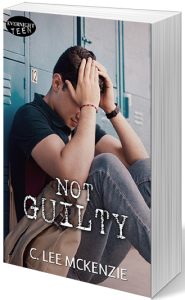
NOT GUILTY can be found on Amazon, Smashwords, Barnes & Noble, Goodreads, and Kobo.
The author’s other young adult books include: Sliding on the Edge, Princess of Las Pulgas, Double Negative, Sudden Secrets
GIVEAWAY
With Halloween celebrated this week, Lee’s giving away five digital copies of NOT GUILTY and a $10 Amazon Gift Certificate. This tour-wide giveaway will end at midnight on Tuesday, Nov. 5th.
To enter the giveaway, just click on the Rafflecopter widget below and follow the instructions. The widget may take a few seconds to load so please be patient. If the widget doesn’t show up, just click HERE and you’ll be directed to the widget.
Thanks for stopping by today during Lee’s visit. Do you enjoy stories where the underdog becomes the champion? Don’t forget to enter the giveaway.
Photo on Visual hunt
The post Trouble Staying Focused? Try Making a List appeared first on Elizabeth Spann Craig.
October 26, 2019
Twitterific Writing Links
by Elizabeth S. Craig, @elizabethscraig
Twitterific writing links are fed into the Writer’s Knowledge Base search engine (developed by writer and software engineer Mike Fleming) which has over 50,000 free articles on writing related topics. It’s the search engine for writers.
Have you visited the WKB lately? Check out the new redesign where you can browse by category, and sign up for free writing articles, on topics you choose, delivered to your email inbox! Sign up for the Hiveword newsletter here.
Business / Miscellaneous
How to Build a Long-Term Writing Career: @jamesscottbell @killzoneauthors
Copyediting Jobs: How to Estimate Hours and Pricing: @SubvCopyEd @JaneFriedman
How To Be A Professional Author And Not Die Screaming And Starving In A Lightless Abyss: @ChuckWendig
29 Parenting Blogs and Magazines That Pay Freelance Writers: @briannarbell @thewritelife
Conferences and Events / Miscellaneous
Frankfurt 2019: Big Crowds, Upbeat Industry, Social Purpose: @Porter_Anderson @Book_Fair @pubperspectives
Frankfurt’s Guest of Honor Spotlight Passes from Norway to Canada: @HannahSJohnson @pubperspectives @Book_Fair
Sharjah International Book Fair Expands Its Publishers Conference: @Porter_Anderson @pubperspectives
In London, the Polari Prize Goes to Angela Chadwick and Andrew McMillan: @Porter_Anderson @AndrewPoetry @_AngelaChadwick @PolariPrize
The UK’s Comedy Women in Print Prize Adds Graphic Novel Category: @Porter_Anderson @CWIPprize @HelenLederer @pubperspectives
Conferences and Events / NaNoWriMo
How NaNoWriMo Can Actually Help Your Mental Health: @HBlackwell17
NaNo Prep: Pick a New Daily Word Count Goal: from Let’s Write Some Novels
Rocking NaNoWriMo: Five Tips for Speculative Writers: @MelanieMarttila @DIYMFA
Road Trip to NaNo: The Benefits of Attending Write-Ins: @JudyLMohr @EmmyLou_James @NaNoWriMo
NaNoWriMo Resources Are for Everyone: by Melinda Brasher
10 Tips To Rock NaNoWriMo: @JennyHansenCA
Top 10 Hacks to Finishing NaNo EARLY: @LisaLatteBooks @NaNoWriMo
One Writer Shares Her Process for NaNoWriMo Prep for a Cozy Mystery: @courtagonist @CozyMysEscape
Is NaNoWriMo for you? @pubcoach @NaNoWriMo
1 Writer Plans to Tackle NaNoWriMo With a Specialty Tea Advent Calendar By Her Side: @LisaLatteBooks @NaNoWriMo
Expectation Versus Reality: 10 Truths You Should Know About NaNoWriMo: @NaNoWriMo @WritersDigest
NaNoWriMo Prep: How to Write 2000 Words a Day: by Let’s Write Some Novels
Last Minute NaNoWriMo Prep: @ReedsyHQ
Creativity and Inspiration / Goal setting
Win Big as a Writer with These Smart Goal Setting Tips: @MichaelLaRonn
Creativity and Inspiration / Inspiration
How to get in the flow with your writing: @pubcoach
Creativity and Inspiration / Inspiration / Reading as Writers
7 Poets to Read: @alicebroster1 @bustle
Crime Novels in the Age of Prohibition: by Ashley Weaver @CrimeReads
“Goodnight Moon,” Almost 75 Years Later: by Brian Goedde @LAReviewofBooks
7 Essential Contagion Novels: by David Koepp @CrimeReads
Creativity and Inspiration / Productivity / Fitting in Writing
Tips for Improving Writing Productivity: from Just a Writing Aid
When is the Best Time to Write? @pubcoach
Daily Writing Habit: How to Crush It Every Day: @MichaelLaRonn
Creativity and Inspiration / Success
Reinvent the Path to Success: @MichaelLaRonn @IndieAuthorALLI
Creativity and Inspiration / Target audience
How Discovering Your Audience in Writing Will Transform Your Writing: @suelarkinsweems @write_practice
Creativity and Inspiration / Writing Life
The Seductive Power of a New Book Idea: When to Give in: @RuthHarrisBooks
Tips for Joining Book Clubs: by Patricia Sands @WomenWriters
What Makes a Writer a “Real” Author? @JamiGold
Unexamined Beliefs: Do they Keep You from Writing Success? @annerallen
Opportunities to Improve as a Writer: @PaulaSMunier @CareerAuthors
Writing With Illness: @AuthorCynthiaH @WomenWriters
Writers: Be aware of when research and prep turns into procrastination (comic): @inkyelbows
4 Ways to Stay Productive While Writing a Novel: @NathanBransford @NaNoWriMo
Literary Snobbery: Why It’s Toxic and How to Combat It: @_HannahHeath
Work Like A (Real) Dog: @10minnovelist
How to Live ‘Comfortably’ With Impostor Syndrome: @MegDowell
3 Ways to Keep Writing When Times Are Tough: @Self_Pub_School
Genres / Fantasy
Fantasy Book Title Generator: @Writers_Write
Entomology and Ants in Fantasy: @ClarkTCarlton @DanKoboldt
Genres / Horror
Seven Horror Audio Drama Podcasts (Beyond “The Black Tapes”): @wilw_writes @Discover_Pods
Genres / Miscellaneous
Writing Speculative Fiction — Interview With Cadwell Turnbull: @CadwellTurnbull @DIYMFA
Genres / Mystery
The Strange Cultural Currency of Art Theft: @JamieMason_ @CrimeReads
Genres / Non-Fiction
Join a Writers’ Group to Help Meet Your Nonfiction Writing Goals: @NinaAmir
You’ve submitted your non-fiction manuscript: now what? @megankatenelson
Genres / Poetry
Does Poetry Have Street Cred? @Poet_Major @parisreview
Waffle House has an official poet laureate. For real: by Andrew Alexander @AtlantaMagazine
Genres / Science Fiction
The Art of Dimension Jumping in Fiction: @cyallowitz
Genres / Screenwriting
Write Worlds And Characters Actors Want To Play: @Pendensham @CreativeScreen
Primary, Secondary, and Tertiary Characters: @GoIntoTheStory
Promo / Ads
Paid Email Promotions for Cozy Mysteries: @Ellen__Jacobson
Promo / Book Reviews
How to Get Editorial Reviews for Your Self-Published Book: @IngeniumBooks @IndieAuthorALLI
Promo / Miscellaneous
How to Market Your Book – A New Author’s Guide: @Bookgal
Why Human-Centered Marketing Works: @DanBlank
Promo / Podcasts
November is National Podcast Post Month – Why Not Launch One? @ThDigitalReader
Promo / Social Media Tips
5 Ways to Practice Good Virtual Etiquette for Authors: @tessaemilyhall @A3writers
How Do I Promote My Posts on Social Media? by Phil Stamper-Halpin @penguinrandom
Promo / Websites
A One Page Website is Quick and Easy to Create. Here’s How: @AGEditorial @thewritelife
Publishing / Miscellaneous
Patricia Cornwell’s New Spacewalk: ‘Not Just About Putting a Flag on the Moon’: @Porter_Anderson @pubperspectives
Small Claims Copyright ‘CASE Act’ Passes US House of Representatives: @Porter_Anderson @pubperspectives @AmericanPublish @mariraz @AuthorsGuild
An Industry Expert on Publishing Auctions and Nigel Beale’s Coverage of Publishing’s Players: by Richard Charkin @pubperspectives
Publishing / News / International Publishing
In Algeria the biggest cultural event is a book fair. Will the Algiers IBF break its 2.3 million visitor record this year with its focus on young authors? @TNPS10
Spain’s Dolores Redondo Goes to New Orleans for ‘North Face’: @oliviasnaije @DoloresRedondoM @pubperspectives
Dominique Raccah, Prior to Sharjah, Rolls Out ‘Sourcebooks’ International’: @Porter_Anderson @draccah @Sourcebooks @pubperspectives
Swedish Book Publisher Olika on Winning Football Books for Girls: @Porter_Anderson @pubperspectives
Canada’s Cundill Prize Names Fulbrook, Lepore, Lovell as 2019 Finalists: @Porter_Anderson @CundillPrize @pubperspectives
Self Publishing News of the Week (23rd October 2019): by Tom Ashford @pbackwriter @SelfPubForm
At Frankfurt: Firming Up the IPA-APNET Collaboration for Africa: @Porter_Anderson @Book_Fair @AfricanApnet @IntPublishers
Croatian Publisher Fraktura Plans Big Print Run for Igor Štiks’ Latest Novel: @oliviasnaije @IgorStiks @pubperspectives
Publishing / Options / Self-Publishing
Self-Publishing is the Best Solution to Low Author Earnings: @OrnaRoss @IndieAuthorALLI
Publishing / Options / Traditional Publishing / Querying
Why Literary Agents and Editors Reject a Book After the First Page: 7 Red Flags: @MegLaTorre
Publishing / Options / Traditional Publishing / Rejections
Why You’re Getting Rejections: @RachelleGardner
Publishing / Process / Formatting
How To Format a Book When Self-Publishing: @kristen_kieffer
Publishing / Process / Self-Publishing
IngramSpark Review & Detailed Step-By-Step Guide: @ScottAllan2 @IngramSpark
Writing Craft / Beginnings
Your First Five Pages: @davidfarland
Writing Craft / Characters / Arc
How to Use a “Truth Chart” to Figure Out Your Character’s Arc: @KMWeiland
The Protagonist’s Journey as Fate: @GoIntoTheStory
Writing Craft / Characters / Development
Establishing a Mentor Character Before She Dies: by Oren Ashkenazi @mythcreants
Writing Craft / Characters / Protagonists
Not Strong Female Characters, Complex Female Characters: @Bang2write
Writing Craft / Common Mistakes
Top 5 Novel Writing Mistakes Authors Make: @Bang2write
Writing Craft / Conflict
Are Your Fight Scenes Boring the Reader? @chemistken
Writing Craft / Lessons from Books and Film
3 Things Learned About Writing From “Mr. Rogers’ Neighborhood”:
Writing Craft / Miscellaneous
Tips for Fiction Writers: Which Character Has the Most to Lose? @PeggySueWells @EdieMelson
Colorful Language: Falling in Love with the Speech Rhythms of the American Southwest: by Rayne Lacko @WritersDigest
5 Unexpected Ways To Fuel Your Story: @AnthonyEhlers @Writers_Write
Good Lists Make Great Stories: @laurabenedict @killzoneauthors
The Ultimate Story Checklist: Lady Bird: @CockeyedCaravan
Writing Coercive Control Into Fiction (Very, Very Carefully): @Helen_Fields @WomenWriters
How Do I Refer to the Viewpoint Character’s Parents? by Chris Winkle @mythcreants
Writing Craft / Pre-Writing / Plotting
3 Iconic Female Leads and How Their Plot Archetypes Work: @Bang2write
Interesting Plot Ideas: 6 Writers’ Insights: @nownovel
Writing Craft / Punctuation and Grammar
While vs. Whilst: by Maeve Maddox @writing_tips
A comic for punctuation nerds: @inkyelbows
How to use parentheses in fiction writing: @LouiseHarnby
Writing Craft / Scenes
Raising the Stakes in Every Scene: @LiveWriteThrive
Writing Craft / Scenes / Conflict
For Fiction, There’s No Superior Fighting Style: from How to Fight Write
Writing Tools / Apps
Preptober (NaNoWriMo Prep): Google Docs Tutorial: @LisaLatteBooks
Writing Tools / Books
Donald Maas and The Emotional Craft of Fiction Writing: @cinapelayo @LitReactor
Writing Tools / Resources
10 Masterclasses for Writers, Poets & Screenwriters to Crush it in 2020: @LauraJTong @WritetoDone
The Top Writing Links From Last Week Are On Twitterific:
Click To Tweet
The post Twitterific Writing Links appeared first on Elizabeth Spann Craig.
October 24, 2019
3 Ways to Keep Writing When Times Are Tough
by Chandler Bolt, @Self_Pub_School
Have you ever struggled to retain your drive and motivation as a writer?
I’m sure we all have. After all, as much as we might wish it was the case, we don’t have unlimited supplies of inspiration and energy. We’re all human. We all get tired and feel like quitting.
I get it. I’ve been there.
The key is not to avoid these feelings. Rather, it’s what we do with them that counts. Do we choose to give up, or do we find the strength to keep writing even when it isn’t easy?
Today I’d like to share three proven ways to keep writing even when it feels impossible. I’ve seen these work for countless students and I hope they serve you well.
Set A Measurable Goal
Sometimes, the reason we can’t summon the energy to make progress with our writing projects is due to their seeming enormity.
When we view a writing project, such as producing a new book, as an entire whole, it seems too big to cope with and we lose our motivation for doing it.
However, when we break our writing project down into manageable goals, it suddenly seems achievable and we regain our motivation.
One of the best ways to do this is to set an end date for your writing project. Then, divide the total word count between the number of days that you have. This makes the intimidatingly large overall goal into a manageable and motivational smaller daily goal.
If you’re the kind of writer who doesn’t write each and every day, or does but in uneven amounts, you can consider setting a weekly goal instead. This allows you to be flexible with how much you write on different days. You just need to have the discipline to avoid leaving too much of your word count goal until the end of the week!
Change Your Writing Environment
As writers, we’re influenced by the environment we find ourself in. This applies both to external factors, such as the desk we write at, as well as internal factors, such as how tired we are or how much caffeine we’ve had.
One quick way to nudge your writing motivation in the right direction is to change the place you write. If you usually write in your home, consider going to a coffee shop or other place with lots of people. The energy and change of scene can add a new zest to your writing.
You can also think about changing the tool you write with. For example, if you usually write on your laptop, think about treating yourself to a nice notebook and writing longhand for a change. Sometimes, simply changing this small thing will boost your writing and give it a new energy and style.
We owe it to ourselves to challenge anything that is holding back our writing progress. If you’re feeling stuck or low on motivation, switch up your writing environment and see if it helps.
Connect With Other Writers
Isolation can be the enemy of creativity.
When we’re stuck in our own head, focusing on our own troubles and struggles as writers, we get trapped in a cycle of rumination and looking inwards.
To break free of a negative cycle of introspection, connect with your fellow writers.
It might be the last thing you feel like doing, but it’s important to break from your comfort zone and do it anyway.
By connecting with your fellow writers, either online or in person, you stop focusing on yourself and instead start helping others out. Interestingly, this is often the most effective remedy for our own writing woes.
When we stop focusing on our own problems, they diminish in importance. The energy we waste worrying is used for a positive purpose, and people help us out in turn.
Although many of us writers are naturally introverted, it doesn’t mean we should shun our fellow authors. Establishing a support network of authors is a priceless resource to be able to call on when times get tough.
This Too Shall Pass
Thank you for taking the time to check out three proven approaches you can use to keep your writing tank full of energy, even when times get truly tough.
Ultimately, it doesn’t so much come down to a particular strategy, because there are many that can work.
Instead, it is more of a mindset – an unshakeable core belief that you can use to get through times of trouble and stress.
It’s an idea taken from the Stoic school of thought, but one which is found in many different belief systems.
“This too shall pass”. It’s the idea that no matter how good or bad times are, they will inevitably change.
Sometimes, when we’re struggling to write and feeling down, it’s hard to look ahead to better times.
But remember that things will inevitably change. Just hang in there, and get ready for your writing motivation to make a powerful comeback. You’ve got this!
How do you find the motivation to continue writing when life is challenging?
 Chandler Bolt is the host of the Self Publishing School podcast & the author of 6 bestselling books including his most recent book titled “Published.”. Through his books, podcast, training videos, and Self-Publishing School, he’s helped thousands of people on their journey to writing their first book.
Chandler Bolt is the host of the Self Publishing School podcast & the author of 6 bestselling books including his most recent book titled “Published.”. Through his books, podcast, training videos, and Self-Publishing School, he’s helped thousands of people on their journey to writing their first book.
Writer Chandler Bolt with @Self_Pub_School offers 3 ways writers can keep writing when life is tough:
Click To Tweet
Photo on Visualhunt
The post 3 Ways to Keep Writing When Times Are Tough appeared first on Elizabeth Spann Craig.









